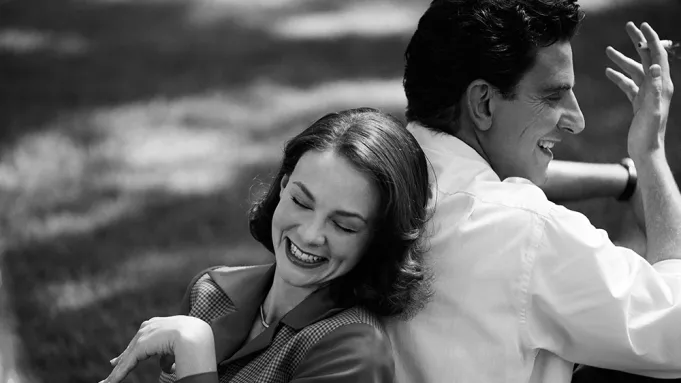In Bradley Cooper‘s second directorial venture, “Maestro,” the actor takes on the role of the legendary American conductor and composer Leonard Bernstein. The film offers an intimate look at Bernstein’s life, brilliantly portrayed by Cooper, capturing the essence of a man brimming with contradictions, charisma, and creative fervor.
Cooper’s portrayal of Lenny, as Bernstein was affectionately known, is nothing short of captivating. He brings a unique charm to the character, infusing him with merriment, mischief, and cosmopolitan desire. The film explores the multifaceted personality of Bernstein, highlighting his status as a prodigy, prankster, seducer, and a devoted family man. His public persona leans toward the proper and stentorian, while in private, he radiates a recklessly exuberant spirit.
READ MORE: Maya Hawke Shines as Flannery O’Connor in Wildcat: Exploring the Complexities of a Literary Luminary
One notable aspect of Cooper’s performance is the use of a prosthetic nose, initially a subject of controversy. However, the enhanced nose seamlessly integrates with Bernstein’s regal handsomeness, quickly becoming an unnoticeable aspect of his character. What truly shines are Cooper’s eyes, which exude delight and giddy abandon, making Lenny a spectacle unto himself. With boundless life force, Bernstein expects the world to revolve around him.
The film opens with a poignant prelude, offering viewers a glimpse of an aging Lenny playing a melancholic piano piece in his Connecticut country home. He then confesses his longing for his late wife and soulmate, Felicia. This sets the stage for a journey through Bernstein’s life, starting on November 14, 1943, a pivotal day when the 25-year-old assistant conductor of the New York Philharmonic, Lenny, is unexpectedly called upon to fill in for the ailing guest conductor, Bruno Walter.
Rather than focusing on Bernstein’s ascension to classical music stardom, the film takes a different route. It delves into Lenny’s internal world, offering viewers a peek into his thoughts, desires, and complexities. Cooper, who also co-wrote the film with Josh Singer, brings a meticulous intimacy to every scene, infusing each moment with fascination and surprise.
While “Maestro” doesn’t dwell on Bernstein’s iconic moments, such as the Young People’s Concerts, it does reveal his yearning to be recognized as a significant composer. The movie portrays his relentless pursuit of artistry and his identity as a conductor superstar, often overshadowing his aspirations as a composer.
Central to the film is Bernstein’s romantic partnership with Felicia Montealegre, portrayed by the talented Carey Mulligan. Their relationship defies conventional norms, with Felicia understanding and accepting Lenny’s other life. As they marry and raise three children, their partnership appears transcendent. However, beneath the surface lies jealousy, possessiveness, and the complexities of Lenny’s identity.
“Maestro” doesn’t seek to explain their relationship; instead, it presents it in all its mystery, reflecting a unique romantic partnership that defies categorization. The film leaves viewers pondering the extent to which Lenny’s actions are motivated by love or the need to maintain a facade in a society where homosexuality is stigmatized.
Cooper’s film offers a stunning portrait of an artist grappling with narcissism, devotion, betrayal, and despair within the confines of his marriage. The movie forces audiences to confront the tragedy of a homophobic society while remaining unapologetically honest about Bernstein’s flaws.
Despite the grandeur of Bernstein’s passion and his undeniable charisma, “Maestro” evolves into a duet between Bradley Cooper and Carey Mulligan. Their performances elevate the film, making it a haunting and unforgettable portrayal of a musical genius navigating a world of contradictions and desires.
